Alison McGhee's Blog, page 3
July 16, 2016
Poem of the Week, by Warsan Shire
Yesterday a friend posted a plea to the dear people of earth, to stop, stop stop stop, please let’s just have one week that’s horror-free. Yes please. This tiny brain of mine wasn’t built to withstand the kind of information that comes at it day in and day out, every minute of every hour. Hell, my brain wouldn’t be able to handle constant good news, let alone the kind of news that these past few weeks have been all about. Sometimes you just keep waking up, all night long, thinking what can I do, what can I do, how can I make it better, how can I make it better, while images from the day’s onslaught scroll through your mind like videos. Breathe in, breathe out, focus on the breath, do what you can, do what you can, do what you can. Sometimes all you can do, before you haul yourself up and get back to trying, is seek out a poem that expresses exactly the way you feel in this moment. Like this poem below.
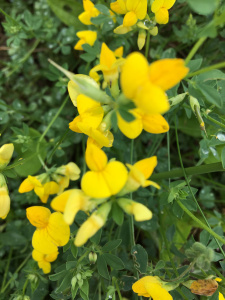
what they did yesterday afternoon
– Warsan Shire
they set my aunts house on fire
i cried the way women on tv do
folding at the middle
like a five pound note.
i called the boy who used to love me
tried to ‘okay’ my voice
i said hello
he said warsan, what’s wrong, what’s happened?
i’ve been praying,
and these are what my prayers look like;
dear god
i come from two countries
one is thirsty
the other is on fire
both need water.
later that night
i held an atlas in my lap
ran my fingers across the whole world
and whispered
where does it hurt?
it answered
everywhere
everywhere
everywhere.
For more information on Somali-born Warsan Shire (whose poetry Beyonce set to music and movement in “Lemonade”), please click here.
Website
Blog
Facebook page
@alisonmcghee







July 9, 2016
Poem of the Week, by Langston Hughes
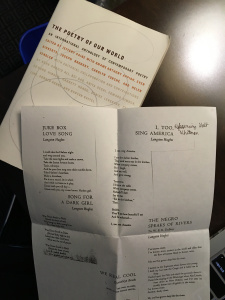 I’ve sat in silent, exhausted rage around dinner tables listening to men and women argue about rape and which factors that lead up to it are under a woman’s control. Sometimes I leave the room and go into the kitchen to bang my head against a hot stove, because that feels better than listening to good men, many of whom I like and respect, explain with care and patience how women shouldn’t get so drunk, especially late at night, how they shouldn’t walk alone, shouldn’t wear certain outfits, that it just is not safe, how they wish so much the world wasn’t like that for women, but it is. What a revelation, I think, thanks for solving that whole rape thing.
I’ve sat in silent, exhausted rage around dinner tables listening to men and women argue about rape and which factors that lead up to it are under a woman’s control. Sometimes I leave the room and go into the kitchen to bang my head against a hot stove, because that feels better than listening to good men, many of whom I like and respect, explain with care and patience how women shouldn’t get so drunk, especially late at night, how they shouldn’t walk alone, shouldn’t wear certain outfits, that it just is not safe, how they wish so much the world wasn’t like that for women, but it is. What a revelation, I think, thanks for solving that whole rape thing.
We have a rape problem because men rape women. That’s where the conversation begins. How do you change a culture in which, at such a deep level that it’s nearly invisible, there is a belief that women are prey + men can’t control their sex drive = rape? You start by pointing it out. By talking. And with recognizing that men have to change that culture.
That right there is as close as I can come to even beginning to imagine what it’s like to be black in my country. And the way to start changing a culture in which racism is so systemic that it’s barely noticeable to white people is for white people to point it out to each other, to have those hard conversations. It is not the responsibility of black people. This is on white people.
Yesterday I walked past a little free library. The first book I saw in it was The Poetry of Our World, which I took with me. In it, as a bookmark, was a quarter-folded sheet of paper with poems by Langston Hughes and Gwendolyn Brooks. If I were a superstitious person who looked to the universe for signs, I would have taken that as a sign that one of those poems should be the poem of the week. I’m not that kind of person, but Mr. Hughes, I see how beautiful you are, and I am ashamed.
I, too, sing America
– Langston Hughes
I am the darker brother.
They send me to eat in the kitchen
when company comes,
but I laugh,
and eat well,
and grow strong.
Tomorrow,
I’ll be at the table
when company comes.
Nobody’ll dare
say to me,
“Eat in the kitchen,”
then.
Besides, they’ll see how beautiful
I am
and be ashamed–
I, too, am America.
For more information on Langston Hughes, please click here.
Website
Blog
Facebook page
@alisonmcghee







July 2, 2016
Poem of the Week, by Jim Daniels
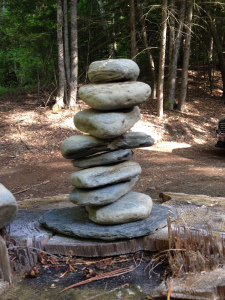
A long time ago I decided not to grade my students on their creative writing, even though creative writing is what I teach. Grading someone on their talent usually means they’ll write what they think they they’re good at, smart at. Push out those boundaries, I tell them, try something new, something you’ve never tried before. Who knows what you might come up with? What they come up with is sometimes astonishing, and when they surprise themselves with it the whole room fills with light and energy and power. Smartness and talent are cool to witness and to experience, but beyond that, who cares? So many other things matter so much more. Like kindness.
Dim
– Jim Daniels
Today my son realized someone’s smarter
than him. Not me or his mom —
he still thinks we know everything —
one of the other kids, Nathan. Making fun
of him at the computer terminal
for screwing up at the math game.
Other kids laughing at him. Second grade.
I’m never gonna be as smart as him,
he says.
I’m never gonna be as smart
as half my students if we’re talking
IQs. He doesn’t want me to explain.
He wants me to acknowledge
that he’s dumb. He’s lying in bed
and taking his glasses off and on,
trying to get them perfectly clean
for the morning. I’m looking around
his dark room for a joke or some
decent words to lay on him. His eyes
are glassy with almost-tears. Second grade.
The world wants to call on him.
I take his hand in mine.
For more information on Jim Daniels, please click here.
Website
Blog
Facebook page
@alisonmcghee







June 19, 2016
Poem of the Week, by Robert Hayden
My father and I were in the car last month, driving back from the diner where we go early each morning I’m home visiting my parents. (Say the word “home” to yourself – what’s the image that comes instantly into your mind?) I asked him if he thought t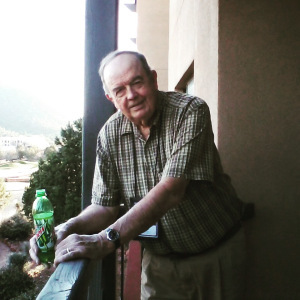 here was anything beyond this world, and that my grandmother –his mother– had told me near the end of her life that she believed in a heaven where my grandfather, and her parents, and her sister and her friends would all be waiting for her when she got there. My father laughed and said he didn’t know about that, but that he did believe there was some kind of force in the universe, beyond his power to grasp. When I was a child my father was a force in my universe. He was a giant man with giant physical strength, the kind of man who would pour Clorox on a bleeding wound to disinfect it and avoid a doctor visit. This poem, by Robert Hayden, always comes to mind on Father’s Day. I first read it as a child and didn’t understand it. But I do now.
here was anything beyond this world, and that my grandmother –his mother– had told me near the end of her life that she believed in a heaven where my grandfather, and her parents, and her sister and her friends would all be waiting for her when she got there. My father laughed and said he didn’t know about that, but that he did believe there was some kind of force in the universe, beyond his power to grasp. When I was a child my father was a force in my universe. He was a giant man with giant physical strength, the kind of man who would pour Clorox on a bleeding wound to disinfect it and avoid a doctor visit. This poem, by Robert Hayden, always comes to mind on Father’s Day. I first read it as a child and didn’t understand it. But I do now.
Those Winter Sundays
– Robert Hayden
Sundays too my father got up early
and put his clothes on in the blueblack cold,
then with cracked hands that ached
from labor in the weekday weather made
banked fires blaze. No one ever thanked him.
I’d wake and hear the cold splintering, breaking.
When the rooms were warm, he’d call,
and slowly I would rise and dress,
fearing the chronic angers of that house,
Speaking indifferently to him,
who had driven out the cold
and polished my good shoes as well.
What did I know, what did I know
of love’s austere and lonely offices?
For more information on Robert Hayden, please click here.
Website
Blog
Facebook page
@alisonmcghee







June 12, 2016
Poem of the Week, by Billy Collins
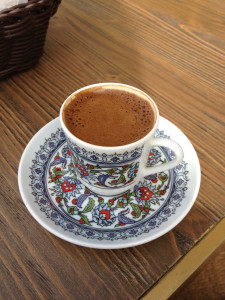 When it comes time to leave this world? That one perfect cup of coffee in the morning. The snap of the cards being shuffled for another game of rummy late at night at a bar. The red shirt I always wore on Saturday nights at the Alibi. The look on my toddler’s face that day he bent over laughing at the ferns unfurling in the back yard because to him they looked like dragons. The scarred brown heavy heft of the chunk of wood I bought at a garage sale and use as a cutting board. These are the things that come to mind, when I think about what I’ll most miss.
When it comes time to leave this world? That one perfect cup of coffee in the morning. The snap of the cards being shuffled for another game of rummy late at night at a bar. The red shirt I always wore on Saturday nights at the Alibi. The look on my toddler’s face that day he bent over laughing at the ferns unfurling in the back yard because to him they looked like dragons. The scarred brown heavy heft of the chunk of wood I bought at a garage sale and use as a cutting board. These are the things that come to mind, when I think about what I’ll most miss.
So why are so many poets afraid to write about ordinariness? Stitch that abstraction back down to earth, I sometimes tell my students. Give us a shoelace or a candy wrapper or a torn birthday card to hang our hearts on.
Poem of the Week, by one of my favorite poets, a man who has never been afraid to write about the enchantment of ordinary things.
Aimless Love
– Billy Collins
This morning as I walked along the lakeshore,
I fell in love with a wren
and later in the day with a mouse
the cat had dropped under the dining room table.
In the shadows of an autumn evening,
I fell for a seamstress
still at her machine in the tailor’s window,
and later for a bowl of broth,
steam rising like smoke from a naval battle.
This is the best kind of love, I thought,
without recompense, without gifts,
or unkind words, without suspicion,
or silence on the telephone.
The love of the chestnut,
the jazz cap and one hand on the wheel.
No lust, no slam of the door –
the love of the miniature orange tree,
the clean white shirt, the hot evening shower,
the highway that cuts across Florida.
No waiting, no huffiness, or rancor –
just a twinge every now and then
for the wren who had built her nest
on a low branch overhanging the water
and for the dead mouse,
still dressed in its light brown suit.
But my heart is always propped up
in a field on its tripod,
ready for the next arrow.
After I carried the mouse by the tail
to a pile of leaves in the woods,
I found myself standing at the bathroom sink
gazing down affectionately at the soap,
so patient and soluble,
so at home in its pale green soap dish.
I could feel myself falling again
as I felt its turning in my wet hands
and caught the scent of lavender and stone.
For more information about Billy Collins, please click here.
Website
Blog
Facebook page
@alisonmcghee







June 4, 2016
Poem of the Week, by Kenneth Rexroth
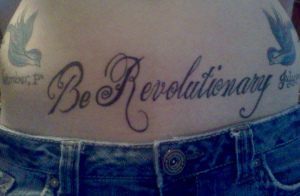 “Live every day like it’s your last because someday you’re going to be right.”
“Live every day like it’s your last because someday you’re going to be right.”
“I am America. I am the part you won’t recognize. But get used to me. Black, confident, cocky, my name not yours. My religion, not yours; my goals, my own; get used to me.”
“The fight is won or lost far away from witnesses – behind the lines, in the gym, and out there on the road, long before I dance under those lights.”
“Man, I ain’t got no quarrel with them Viet Cong. No Vietcong ever called me nigger.”
Last night I woke up in the middle of the night to the news that Muhammad Ali had died. He was a hero to me, as he was to so many others. Not because he was a boxer (I’m not a fan of boxing; Ali suffered from Parkinson’s for over thirty years) but because he was only and ever himself; he stood up for what he believed in and he never backed down. Ali was tough as hell, and so is this poem.
The Bad Old Days
– Kenneth Rexroth
The summer of nineteen eighteen
I read The Jungle and The
Research Magnificent. That fall
my father died and my aunt
took me to Chicago to live.
The first thing I did was to take
a streetcar to the stockyards.
In the winter afternoon,
gritty and fetid, I walked
through the filthy snow, through the
squalid streets, looking shyly
into the people’s faces,
those who were home in the daytime.
Debauched and exhausted faces,
starved and looted brains, faces
like the faces in the senile
and insane wards of charity
hospitals. Predatory
faces of little children.
Then as the soiled twilight darkened,
under the green gas lamps, and the
sputtering purple arc lamps,
the faces of the men coming
home from work, some still alive with
the last pulse of hope or courage,
some sly and bitter, some smart and
silly, most of them already
broken and empty, no life,
only blinding tiredness, worse
than any tired animal.
The sour smells of a thousand
suppers of fried potatoes and
fried cabbage bled into the street.
I was giddy and sick, and out
of my misery I felt rising
a terrible anger and out
of the anger, an absolute vow.
Today the evil is clean
and prosperous, but it is
everywhere, you don’t have to
take a streetcar to find it,
and it is the same evil.
And the misery, and the
anger, and the vow are the same.
For more information on Kenneth Rexroth, please click here.
Website
Blog
Facebook page
@alisonmcghee







May 27, 2016
Poem of the Week, by Eve Grubin
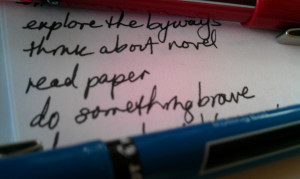 Every morning, soon as I wake up, I make a list of things to do that day. As the day goes on, things get crossed off, until night comes, at which point I turn into a pumpkin and can do no more. Whatever wasn’t done on that day’s list goes onto tomorrow’s list. Once in a great while –like once a year or so– the end of the afternoon approaches and it looks as if everything on the list might actually get crossed off. This is a terrifying thought –what would happen if there were nothing left on the list?– so I quickly add a couple more things. To leave this world without having done it all, I guess that’s the only thing that feels right to me. So you can see why I love this poem.
Every morning, soon as I wake up, I make a list of things to do that day. As the day goes on, things get crossed off, until night comes, at which point I turn into a pumpkin and can do no more. Whatever wasn’t done on that day’s list goes onto tomorrow’s list. Once in a great while –like once a year or so– the end of the afternoon approaches and it looks as if everything on the list might actually get crossed off. This is a terrifying thought –what would happen if there were nothing left on the list?– so I quickly add a couple more things. To leave this world without having done it all, I guess that’s the only thing that feels right to me. So you can see why I love this poem.
Unfinished
– Eve Grubin
My husband has trouble finishing things.
When he washes the dishes
he leaves at least one pot in the sink and a few pieces of silverware.
He says that my writing about this
may constitute lashon hara, speaking negatively about others.
‘Not finishing things is zecher l’churban,’ he adds,
a way of remembering the destruction of the Temple
which stood in Jerusalem nearly two-thousand years ago.
Now he’s in the other room making the bed, which will look lovely
except for a few untucked corners, a pillow askew,
strange for a man who is slightly OCD, who can’t bear
a slanted piece of paper on my desk.
Yesterday, he almost
finished his article on Ælfric’s use of Latin in Old English prose,
and he began one of the tasks on his list of things to do.
Who needs finality when unfinishing creates a longing
for what has not yet happened?
For more information on Eve Grubin, please click here.
Website
Blog
Facebook page
@alisonmcghee







May 21, 2016
Poem of the Week, by Jalal al-Din Rumi
For the story behind this week’s choice of poem, click here.
Poem excerpt from One-Handed Basket Weaving, by Rumi
I’ve said before that every craftsman
searches for what’s not there
to practice his craft.
A builder looks for the rotten hole
where the roof caved in.
A water-carrier
picks the empty pot.
A carpenter
stops at the house with no door.
Workers rush toward some hint
of emptiness, which they then
start to fill. Their hope, though,
is for emptiness, so don’t think
you must avoid it. It contains
what you need!
Dear soul, if you were not friends
with the vast nothing inside,
why would you always be casting your net
into it, and waiting so patiently?
Website
Blog
Facebook page
@alisonmcghee







May 15, 2016
A few things you learned last month at the Sharjah International Reading Festival in the United Arab Emirates

That the flight from Los Angeles to the United Arab Emirates is one of the longest nonstops in the world. And that the flight path is not over the Pacific but a huge arc over the United States, Canada, the far, far north and then south, something you figured out only when, a couple hours into the flight, you looked out your window and thought, Wait a minute, I recognize those mountains! Those are the Rockies!
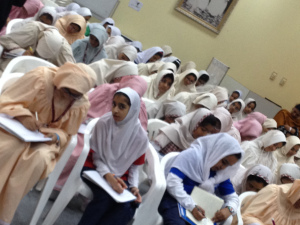
When given a writing prompt – write about a place you love, using all five senses to describe it – children the world over, no matter their religion or dress or gender, will write about their grandmother’s kitchen or their favorite playground or a place their family goes on vacation or their bedroom, where they are surrounded by their books and toys and stuffed animals.
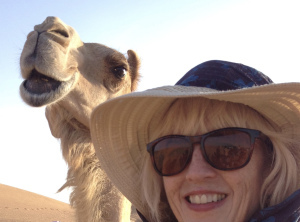
That if you are given the chance to head to the desert for an excursion that involves camels, slaloming down enormous dunes in four-wheel drive vehicles with half the air let out of their tires, a henna tattoo, a turn at a hookah, a Sufi spinning dancer and wandering around the shifting sands of shifting dunes and thinking about everything that lies beneath that shifting sand, you should do it.
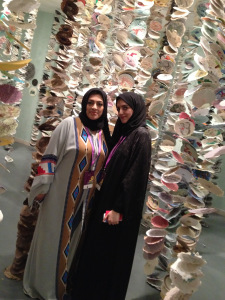
That if the quiet young driver of the car ferrying you from the Expo Center to the hotel late at night suddenly asks if you have ever tried traditional Arab tea, and you tell him you haven’t, and he asks if you want to try some, say yes. Then sit in the back seat of the car as he leaves the highway and drives here and there on the twisting narrow streets of an unfamiliar neighborhood. Think about the trust we place in other human beings every minute of every day, that our cars were assembled with care, that the pipelines and poles that bring us fuel and electricity will hold, that the food we eat isn’t poisoned, that the stranger driving you down unfamiliar streets in an unfamiliar country speaking a language you wish you could speak but don’t will take care of you. Watch as you pull into a tiny fluorescent-lit shop and a man comes out to the car and your driver tells him “two teas” or what you assume is “two teas” because the man nods and goes back to the shop and comes back with two small styrofoam cups brimming with fragrant tea. When the driver hands you one of them, take a sip: scalding tea steeped with lots of sugar and evaporated milk, from the taste of it anyway. Tell the driver it’s delicious, because it is, and see the smile spread across his face. Drink the entire cup on the way back to the hotel and then tell him again how good it is, and thank you thank you thank you, and then accept his own untouched cup of tea because he sees how much you loved yours, and nod and smile when he tells you his name and that if you want more tea, he will take you back to the shop.
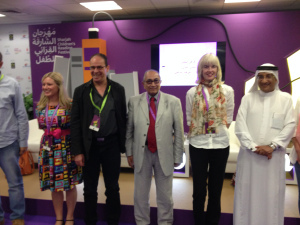
That you can generally count on being the tallest woman, if not the tallest person, in any given photograph.
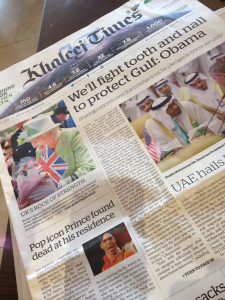
That the death of Prince, which struck you hard and fast when you read about it in the middle of the night, was shared by fans across the world.
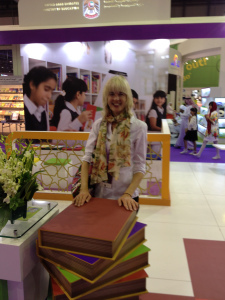
That wandering from display to display in a festival filled with books in Arabic is an experience that a) makes you wish you could read that lovely-to-look-at language and b) brings you back to early childhood, before you knew how to read, when all you focused on were the illustrations and the book cover, and how that focus is, when you think about it, as meaningful as the words themselves.
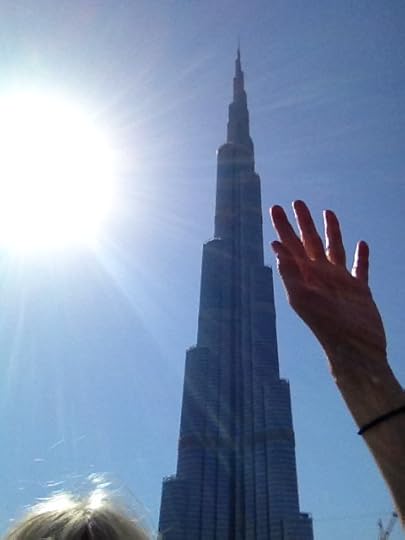
That while you assumed that the Burj Khalifa, the tallest building in the world, might be a little taller than the other tall buildings you’ve seen –the Sears Tower, the Empire State Building– it is actually much, much taller.
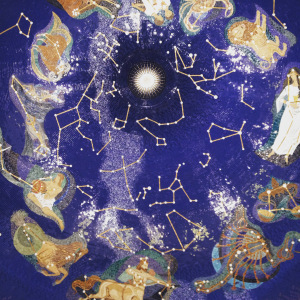
That the Museum of Islamic Civilization is enlightening and informative and also beautiful.
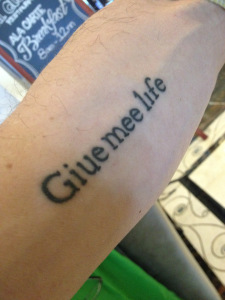
That no matter where in the world or upon whose skin a tattoo is glimpsed, the story behind that tattoo is often one of life – the appreciation of it, the longing for more of it, an inked memorial to a loved one who lost theirs.
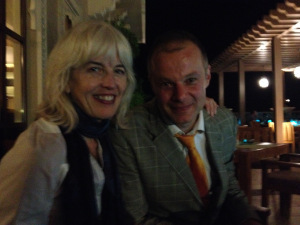
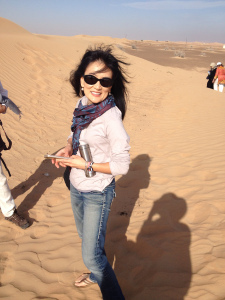
That sometimes friendships are instant, as when, three minutes into conversation, the writer next to you asks you to describe each of your children in a single sentence that captures their essence, and you hop to because what a delightful assignment. And when another writer and you discover, during the course of a few hours spent wandering the souk and talking and bargaining for scarves together, that you share some uncanny similarities.
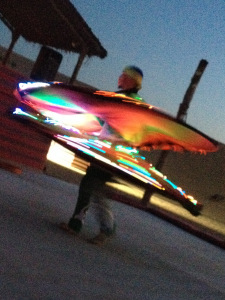
That the sight of a Sufi dancer spinning in the desert on a starry night is mesmerizing.
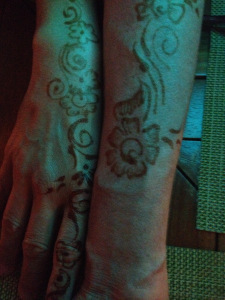
That your shame and embarrassment and apologies over the ongoing hate speech and condemnation of Muslim people by a prominent presidential candidate from your country –as if all followers of Islam, a religion practiced by 1.5 billion people in the world, the biggest religion in the world, are ISIS– will be met, in general, by understanding and sympathy because the people you meet at the festival live in, or are originally from, countries like Iran and Iraq and Pakistan and Syria and Egypt, places where the government has often enacted policies at odds with the living and breathing humans who must live and work under those policies.
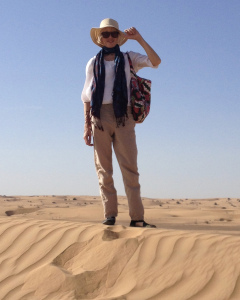
That in the course of a long, intense and beautiful conversation between a fascinating Pakistani doctor /writer and her equally fascinating daughter, in which you learn that 40% of Pakistanis are illiterate, the daughter –whose English is perfect and whose love of reading seems to exceed even the hundreds of writers at the festival’s love of reading — will suddenly exclaim that when she watches British and American movies she sees houses filled with bookcases and books, she feels intense jealousy because So Many Books!, you will picture your own house, filled with bookcases and books, and feel a kind of gratitude for them that you hadn’t felt in your life.

That when you get on the plane at the end of the week for that 16-hour flight back to your own country, you will be thinking about the kindness and generosity of literally everyone you met during your week in Sharjah. And how, when you tried out the four phrases of Arabic that you had attempted to memorize, including “Peace be with you,” the phrase that came back to you was “And the same to you.”







May 11, 2016
My Tattoo Story: Lenore and Alison
Lenore, Hoboken
Alison, Minneapolis, Vermont and southern California
We’re both writers, and we met last month at the Sharjah International Reading Festival in the United Arab Emirates. It was one of those instant connections, an immediate friends-forever sort of thing. The week we spent in Sharjah was filled with deep conversations with writers and illustrators from around the world but mostly from the Middle East. A few days into our trip we went out to the desert together, an experience which included slaloming down steep dunes in four-wheel drive vehicles, a performance by a Sufi spinner, dinner, camels and henna tattoos. Our tattoos, unlike our friendship, will fade in a couple weeks’ time.












